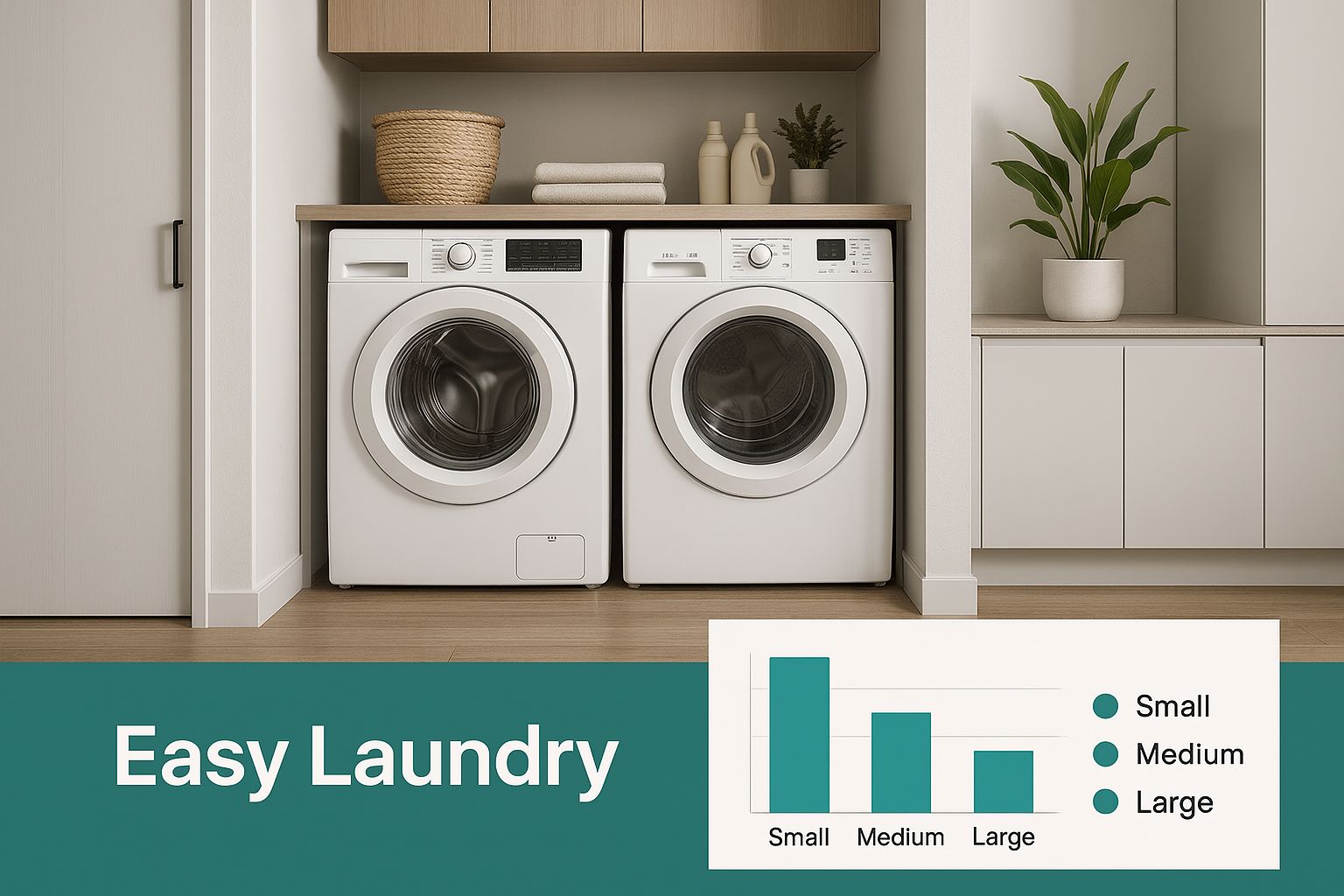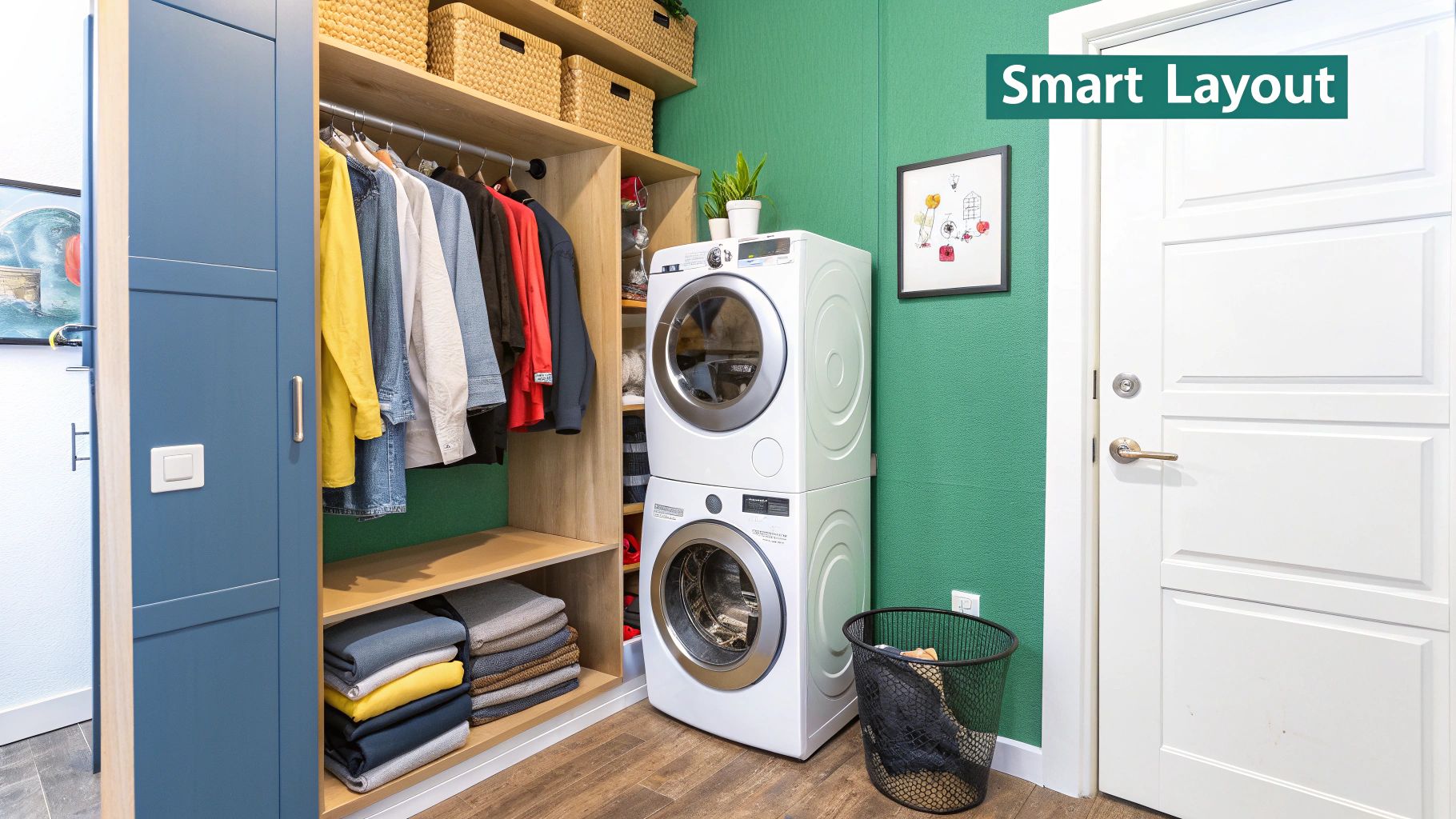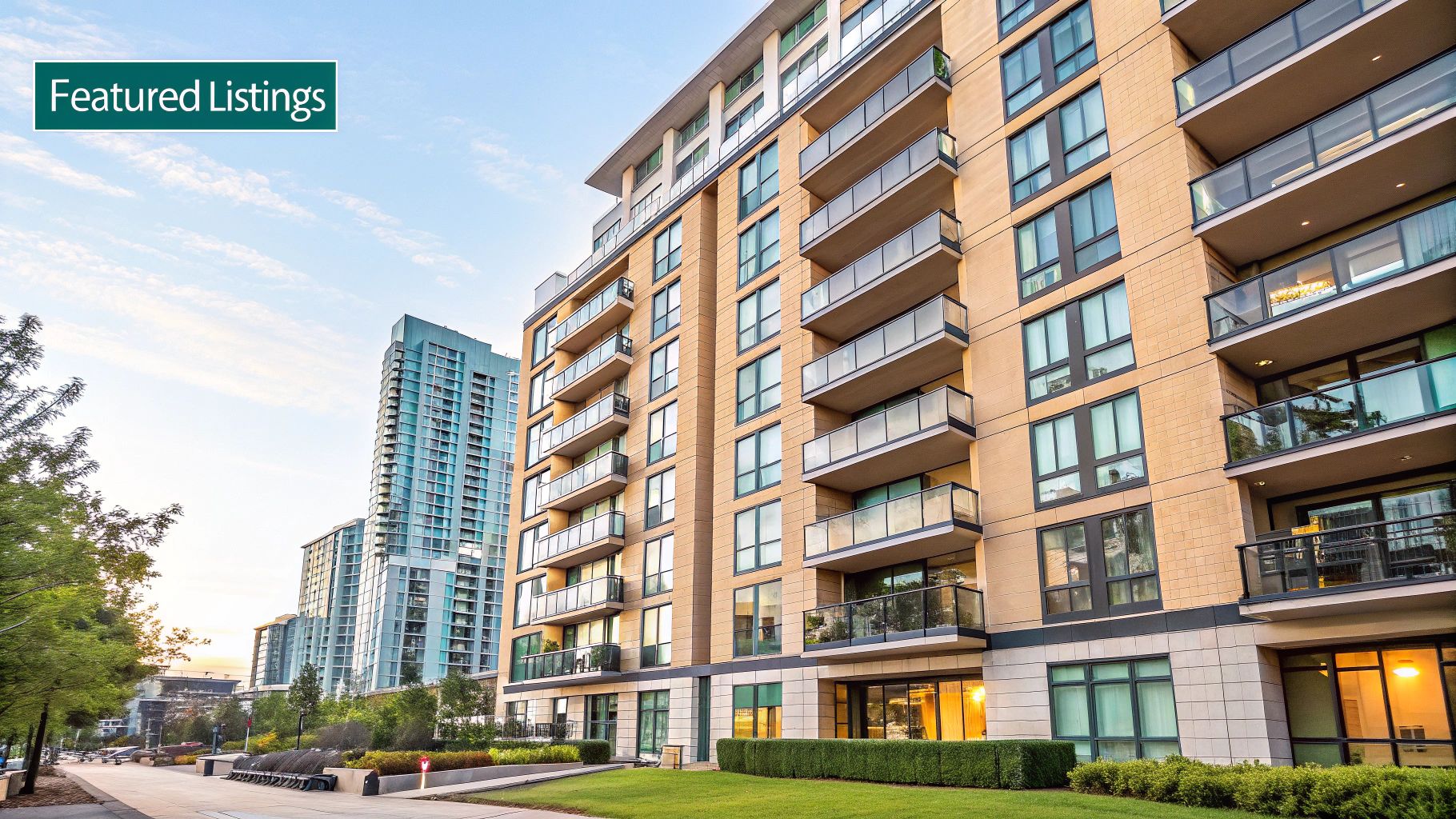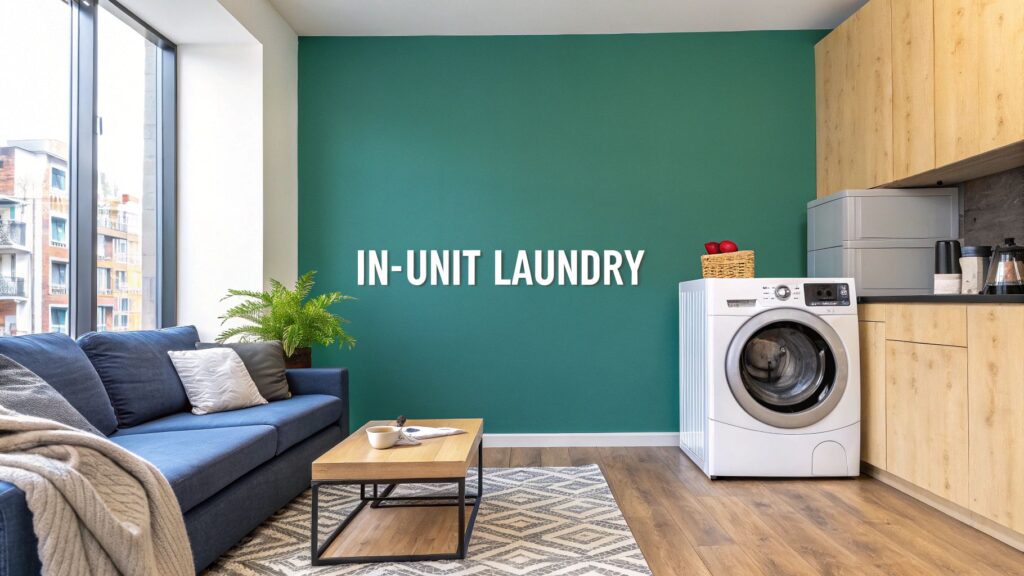Let's be honest, an apartment with washer and dryer in unit is more than just a nice perk—it’s a game-changer. Anyone who has ever lugged a heavy basket to a laundromat or waited for a shared machine to free up knows this feeling. Having your own laundry setup completely transforms a weekly chore.
It gives you the freedom to wash clothes on your own schedule, in the privacy of your own home. It’s one of those amenities that, once you have it, you can't imagine living without.
The Real Value of In-Unit Laundry for Renters
The draw of in-unit laundry isn't just about avoiding the laundromat. It's about how it streamlines your daily life and adds a level of comfort that's hard to put a price on. For many renters today, it’s a non-negotiable feature.
Beyond Mere Convenience
Think about it: no more hauling heavy baskets down three flights of stairs. No more fumbling for quarters. You can throw in a load of laundry while you cook dinner or before you head to bed.
Spill something on your favorite shirt right before a night out? No problem. This kind of on-demand convenience is a major upgrade, especially if you have a packed schedule.
The true luxury of in-unit laundry isn't just about saving time; it's about reclaiming your personal space and schedule. It transforms a weekly chore into a seamless part of your home life.
A Growing Expectation for Modern Renters
This isn't just a feeling; the numbers back it up. Renters increasingly expect amenities that make their busy lives easier, and in-unit laundry sits at the top of that list.
In fact, the global household washer and dryer market was valued at an estimated $50 billion in 2025 and is expected to keep growing. You can dive deeper into the laundry appliance market trends on archivemarketresearch.com. This demand signals a clear preference for convenient, in-home solutions.
Property managers and developers have caught on. They know how much renters want this feature, so finding an apartment with a washer and dryer in-unit is more realistic than it used to be. It’s become a key filter for anyone serious about their apartment search.
How To Find Apartments With In-Unit Laundry
Finding the right apartment is all about searching smarter, not harder. Instead of endlessly scrolling through listings that don't fit the bill, you can zero in on places that have your must-have amenity: an apartment with washer and dryer in unit. This targeted approach saves a ton of time and helps you focus on the properties that are actually worth your attention.
The first, and most powerful, move you can make is mastering the search filters on rental sites. Platforms like Zillow, Trulia, and Apartments.com all have an "Amenities" section. Go there, and check the box for "In-Unit Washer & Dryer." It’s the quickest way to instantly cut through the noise and see only relevant listings.
Refining Your Online Search
Beyond the basic filters, think like a landlord. What words would they use in a listing description? Instead of just searching "apartments for rent," try getting more specific in your search bar.
- "2-bedroom with W/D included"
- "Apartment with laundry in unit"
- "Washer and dryer hookups"
This simple switch can uncover hidden gems that might not have been tagged perfectly in the site's backend system.
As you can see, the convenience of handling laundry right in your own space is a game-changer for many renters.

It’s all about turning a time-consuming chore into a simple, seamless part of your daily routine.
Comparing Your Apartment Laundry Options
To put it all in perspective, here's a breakdown of the pros and cons for different laundry setups you'll encounter, reinforcing why in-unit is often the preferred choice.
| Laundry Type | Convenience Level | Typical Cost | Time Commitment |
|---|---|---|---|
| In-Unit | Highest | Included in rent | Low – done on your schedule |
| Community Laundry Room | Medium | $1.50 – $2.50 per load | Medium – requires planning, waiting for machines |
| Laundromat | Low | $2.50 – $5.00+ per load | High – involves travel and dedicated time blocks |
| Hookups Only | Medium | Rent/buy your own machines + utility | Low once installed, but high initial effort |
Ultimately, while other options work, nothing quite beats the ease of having the machines right there in your apartment.
Look Beyond The Big Search Sites
Sometimes the best places aren't on the major websites. Don't be afraid to go old-school. Pick up the phone and call property management companies in the neighborhoods you love. Ask them directly if they have any units with in-unit laundry coming available soon. You might get a lead on a place before it's even listed.
If you're focusing on a specific city, localized knowledge is key. For those looking in South Florida, for instance, check out our ultimate guide to finding the perfect apartment in Boca, Florida for more targeted advice.
Pro Tip: Set up saved searches on a few different rental websites with your "in-unit laundry" filter locked in. You’ll get an alert the second a new, matching apartment hits the market, giving you a crucial head start.
Budgeting for an Apartment with a Washer and Dryer
Let’s be honest, having a washer and dryer in your own apartment is a game-changer. But that incredible convenience definitely comes at a price, and it's something you need to account for before you sign on the dotted line.
You’ll almost always see a higher price tag on these units. Landlords know this is a premium feature and they adjust the rent to cover their investment in the appliances and any future upkeep. You can generally expect to pay anywhere from $50 to $175 more per month for the luxury of doing laundry in your pajamas.
Of course, the rent hike isn't the only cost. Your utility bills will also see a bump. Running a washer and dryer regularly will increase both your water and electricity usage, so it’s smart to pad your monthly utility budget to avoid any surprises.
Factoring in the Hidden Costs
Beyond the obvious rent and utility increases, a few other potential expenses can pop up. The big one? Maintenance.
This is a critical detail to sort out upfront. You absolutely need to know who pays for repairs if the washer or dryer breaks down. Is it the landlord's responsibility, or will you be on the hook for service calls? Make sure this is spelled out crystal clear in your lease.
Key Takeaway: Look for a specific "appliance addendum" in your lease. A good one will clearly state the landlord is responsible for all repairs, give a reasonable timeline for getting things fixed, and confirm the appliances are part of their standard maintenance coverage.
It also helps to understand why the rent is higher. The U.S. market for washing machines alone was valued at around $7.01 billion in 2025. A decent washer and dryer set can cost a landlord anywhere from $650 to $1200, an investment they naturally pass on to the renter. You can dive deeper into appliance market trends and costs on Accio.com.
To get a true sense of affordability, you have to look at the whole picture. For more on creating a realistic financial plan, check out our guide on budgeting for your Boca Raton apartment—the principles apply no matter where you're renting. By adding up the rent premium, extra utilities, and any potential maintenance costs, you can decide if the convenience is truly worth the price for your budget.
What to Ask When You Tour the Apartment

So, you've found a place that looks great on paper—and it has the in-unit laundry you’ve been looking for. Now comes the most important part: the tour. This is your chance to see things firsthand, so don't just glance at the washer and dryer.
Open them up. Look for any obvious red flags like rust, strange smells, or signs of past leaks around the connections. A quick visual inspection can tell you a lot before you even ask a single question.
Once you’ve had a good look, it’s time to talk to the landlord or leasing agent. Getting direct answers now will save you from major headaches down the road. Treat this part just as seriously as you would questions about rent or utilities.
Who Fixes It When It Breaks?
Let's be realistic: appliances don't last forever. The single most important thing to clarify is the maintenance and repair process. You need to know exactly what happens when the washer stops spinning or the dryer stops heating.
Here are the essential questions to get out of the way:
- Who pays for repairs? Get a clear confirmation that the landlord is responsible for all maintenance and repair costs. You shouldn't be on the hook for their appliance.
- How do I request a repair? Find out the official process. Is there an online tenant portal, a dedicated maintenance line, or do you just text the landlord?
- What's the typical turnaround time? A broken washer is more than a small inconvenience. Knowing whether you can expect a fix in 24 hours or two weeks is a game-changer.
Listen carefully to their answers. This isn't just a friendly chat—what they tell you should match what you see in the lease agreement you eventually sign.
What About Age and Efficiency?
Older machines can be real energy hogs, quietly driving up your utility bills and taking forever to dry a load of towels. Don't be afraid to ask about the age and model of the appliances.
You might even see a single washer-dryer combo unit, which is a clever way to save space in smaller apartments.
These all-in-one machines are becoming incredibly popular. The global market for washer-dryer combos hit around $14 billion in 2023, largely because they're perfect for urban renters. You can see more about the growth of these compact laundry solutions on datainsightsmarket.com.
It's also smart to ask if the appliances are high-efficiency (HE) models. HE machines use significantly less water and energy, which is better for your wallet and the environment. Asking these kinds of detailed questions shows you’re a responsible, detail-oriented tenant and helps you understand the true value of the amenity you're paying a premium for.
Getting It in Writing: Your Lease Is Your Proof
You’ve found the place. You saw the washer and dryer with your own eyes, and the leasing agent even pointed them out. Now comes the most critical part of the process: combing through the lease agreement.
Don't just take their word for it. A friendly verbal confirmation means nothing once you've signed on the dotted line. Only the written contract provides real protection, ensuring that the apartment with a washer and dryer in unit you were promised is the one you actually get.
Find the Appliance Clause
Your first mission is to locate the section of the lease that lists the included appliances. It might be called an "Appliance Addendum" or just be a clause within the main body of the text.
This section absolutely must specify that a washer and dryer are included with your specific unit. If you don't see them listed, they aren't technically part of your deal, no matter what you were told during the tour.
Who Handles Repairs?
Once you’ve confirmed the machines are included, you need to know who’s on the hook for maintenance. Look for language that clearly outlines responsibility for repairs. Any vague wording here is a major red flag.
A good lease will explicitly state that the landlord is responsible for fixing or replacing the appliances at no cost to you.
The best-case scenario is a clause that doesn't just assign responsibility but also sets a timeline. Look for specifics like repairs being completed "within 48 business hours" of a service request. This small detail can be the difference between a minor inconvenience and weeks of laundromat trips.
Finally, do one last scan for any hidden fees. Some leases might sneak in a monthly "appliance usage fee" or other surprise costs. A thorough read-through is your best defense against future headaches.
For a deeper dive into the fine print, check out these smart tips for navigating apartment lease agreements.
Common Questions About In-Unit Laundry

When you're hunting for an apartment with a washer and dryer in unit, a few questions always seem to pop up. Getting straight answers is key to avoiding headaches after you’ve already signed the lease and moved all your boxes in.
Let’s start with the big one: the cost. Does in-unit laundry automatically mean higher rent? Almost always, yes. Think of it as a premium feature, and like any desirable amenity, it comes with a bump in the monthly rent.
This isn't just a random price hike. Landlords factor in the cost of buying the machines, maintaining them over the years, and handling any repairs that come up. While the exact premium can vary a lot depending on your city, most people I've talked to agree that the convenience is well worth the extra cash.
Handling Appliance Breakdowns
Okay, so what do you do when the washer inevitably decides to stop spinning mid-cycle? This is something you absolutely need to clarify before signing anything. The first place to look is your lease—it should spell out the repair policy.
Typically, the landlord is on the hook for fixing appliances that came with the apartment. Your job is to let them know right away. Send a quick email to your property manager detailing the problem; this creates a written record you can refer back to. If you can spot the model number, include that too. A good lease will lay out how long they have to get it fixed.
Key Takeaway: Don't rely on a verbal "we'll take care of it." Your lease is your best friend here. Make sure the landlord's responsibility for appliance repairs is clearly stated in writing to avoid being stuck with an unexpected bill.
Can You Install Your Own Machines?
It's a tempting thought: "What if I just bring my own washer and dryer?" In my experience, this is a non-starter. Most standard rental agreements will flat-out prohibit you from installing your own major appliances.
Why? Because it’s a massive liability. A proper setup requires specific plumbing, electrical hookups, and ventilation for the dryer. Most apartments simply aren't built for it unless the amenity was planned from the start.
Trying to install them anyway can lead to disaster.
- Water Damage: A poorly connected hose is a flood waiting to happen, causing serious damage to your apartment and the units below you.
- Fire Hazards: Dryers need to be vented correctly. If not, lint buildup becomes a major fire risk.
- Liability: Any damage from an unauthorized installation will land squarely on your shoulders, and we’re talking about potentially thousands of dollars in repairs.
You should always get clear, written permission before even thinking about it, but honestly, expect the answer to be no. Landlords just can't take on that kind of risk.
At Cynthia Gardens, we make finding your next home simple. Our beautiful apartments in Boca Raton are designed with the comfort and convenience you deserve. Find your perfect fit with us today.
